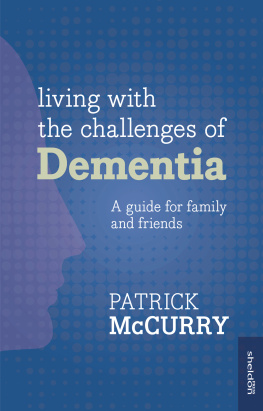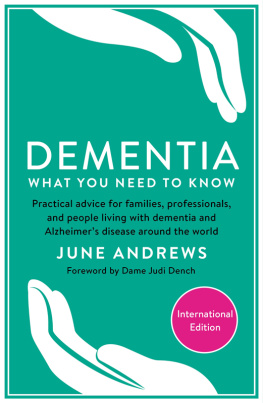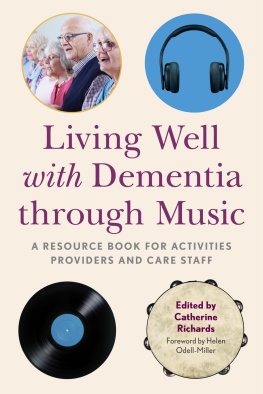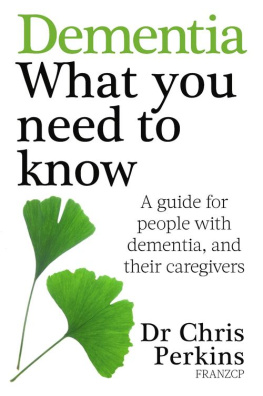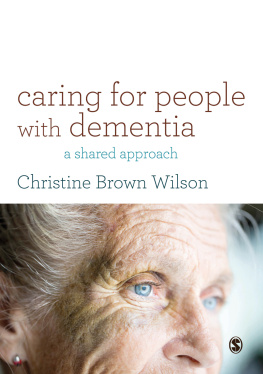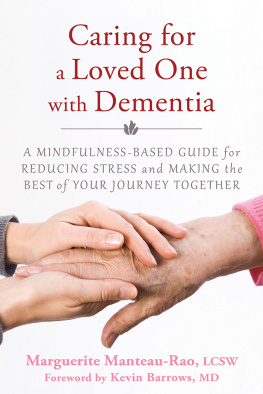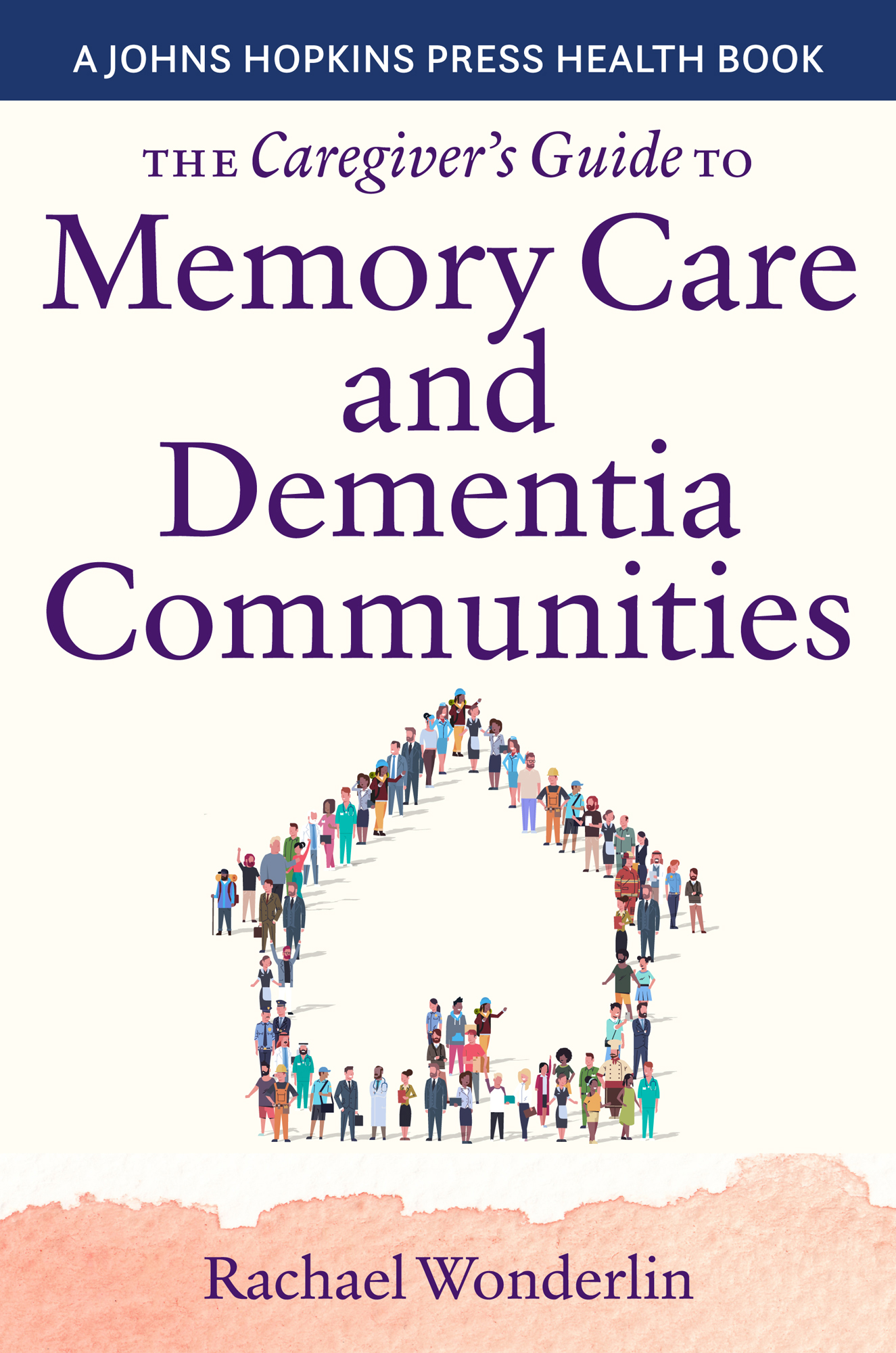Contents
Guide
The Caregivers Guide to Memory Care and Dementia Communities
A JOHNS HOPKINS PRESS HEALTH BOOK
THE Caregivers Guide TO Memory Care and Dementia Communities
Rachael Wonderlin
Foreword by Michelle Tristani

Johns Hopkins University Press | Baltimore
Note to the Reader: This book is not meant to substitute for medical care, and treatment should not be based solely on its contents. Instead, treatment must be developed in a dialogue between the individual and their physician. Our book has been written to help with that dialogue.
Drug dosage: The author and publisher have made reasonable efforts to determine that the selection and dosage of drugs discussed in this text conform to the practices of the general medical community. The medications described do not necessarily have specific approval by the US Food and Drug Administration for use in the diseases and dosages for which they are recommended. In view of ongoing research, changes in governmental regulations, and the constant flow of information relating to drug therapy and drug reactions, the reader is urged to check the package insert of each drug for any change in indications and dosage and for warnings and precautions. This is particularly important when the recommended agent is a new and/or infrequently used drug.
2022 Johns Hopkins University Press
All rights reserved. Published 2022
Printed in the United States of America on acid-free paper
2 4 6 8 9 7 5 3 1
Johns Hopkins University Press
2715 North Charles Street
Baltimore, Maryland 21218-4363
www.press.jhu.edu
Library of Congress Cataloging-in-Publication Data
Names: Wonderlin, Rachael, 1989 author.
Title: The caregivers guide to memory care and dementia communities / Rachael Wonderlin ; foreword by Michelle Tristani.
Description: Baltimore : Johns Hopkins University Press, 2022. | Series: A Johns Hopkins Press health book | Includes index.
Identifiers: LCCN 2021053773 | ISBN 9781421444321 (paperback) | ISBN 9781421444338 (ebook)
Subjects: LCSH: DementiaHandbooks, manuals, etc. | DementiaPatientsCareHandbooks, manuals, etc. | CaregiversHandbooks, manuals, etc. | Long-term care facilities.
Classification: LCC RC521 .W626 2022 | DDC 616.8/3dc23/eng/20211124 ;
LC record available at https://lccn.loc.gov/2021053773
A catalog record for this book is available from the British Library.
Special discounts are available for bulk purchases of this book. For more information, please contact Special Sales at .
For everyone who has been reading my blog posts, books, listening to my podcast, watching my videos, and engaging with me for years.
For everyone who ever felt like they were shouldering this burden alone.
Im glad youre here. It is the gift of a lifetime to be able to provide you with some support and, hopefully, some comfort. Thank you.
Foreword
Michelle Tristani
R achael Wonderlins approach to training and coaching in the memory care arena is entirely refreshing, exceptionally fun, and extremely practical. She provides dementia training with an attitude. Her new book is a comprehensive collection of positive insights and interventions for everyone who supports individuals living with dementia.
The approach described in this book reflects a significant paradigm shift in dementia care, changing the perspective from negative to positive, from disability to ability. Memory care is not what you think it is; it is what you think it is not. Memory care is not only about cognitive testing or brain imaging. It does not have to be about losing oneself or giving up or feeling alone. It is not about being cared for but being cared about; it is not about what is the matter with us but what matters to us. It is all about connecting to what is most important at each stage of dementia. It is about capturing and developing preserved abilities, about setting up the environment for success, and about focusing on the possibilities.
If you are confused about persons that are confused, you are not alone. With so many varied causes of dementia, abundant new research, and the substantial impact of COVID-19 on the progression of all neurodegenerative diagnoses, it is understandable to be overwhelmed.
This book begins by outlining commonly used terms and answers frequently asked questions. In this way, we are positioned to dive into more complex topics with a consistent foundation.
Rachael hints at ways in which we must counter ageism as she outlines the negative connotation via the use of the label senility and other ageist terms. Throughout the book, dementia case studies offer an empathetic perspective and are written from the point of view of the person living with dementia. The connections these case studies provide are among the most valuable insights in Rachaels book.
Step by step, we are guided through the process of Embracing Their Reality. This is truly a lesson in mindfulness and centering ourselves first as we work to differentially diagnose our reality versus the reality of the person with dementia. Once we determine where the person is in their reality and timeline, we then can make a true and strong connection. This connection leads to building trust within the relationship. It is trust that diffuses anxiety, frustration, fear, and feelings of loss of control within the person living with dementia.
The use of the term frontline has become commonplace since the start of the COVID-19 pandemic. All chapters focus on the skill of frontline community care partners. At the close of each chapter, Putting It into Practice sections assist us in applying the tools, individualized skills, and plans in the course of daily caregiving. Rachael keeps it real with typical life situations that maximize our ability to immediately put new skills into practice. Each chapter builds upon the next for a cumulative increase in our confidence and skill readiness.
I am a believer of approaching challenges without regrets. Dementia is a challenge to say the least. As we read and review the guidance and reassurance Rachael provides, our confidence increases. Making meaningful connections throughout each day profoundly affects our lives, the lives of persons living with dementia, and the lives of all those watching us turn dementia care communication around.
Michelle Tristani, MS/CCC-SLP, is a cognitive disorders and dementia specialist as well as a national leader, coach, and trainer in dementia care.
PART I Defining and Understanding Dementia
I begin this book with necessary information about what dementia is and why an accurate diagnosis is so important. I also introduce some key terms used throughout the book. Information about the medications for treating dementia can be found in . Although I am not a physician, I do provide an overview of certain medications and how they are used so that you can discuss the options with your loved ones doctor and health care team. It is important to discuss diagnosis, prognosis, staging, treatment, and other relevant issues with a medical professional who is knowledgeable about dementia.
CHAPTER 1 Why This Book Is Worth Reading
I love working in the field of dementia care. My goal, through my blog, podcast, books, and live workshops, is to provide caregivers with useful skills. By this I mean actions you can take today, immediately, based on your needs in caring for someone living with dementia. I truly believe thats the whole point of learningto gain skills and education that you can put into practice.



